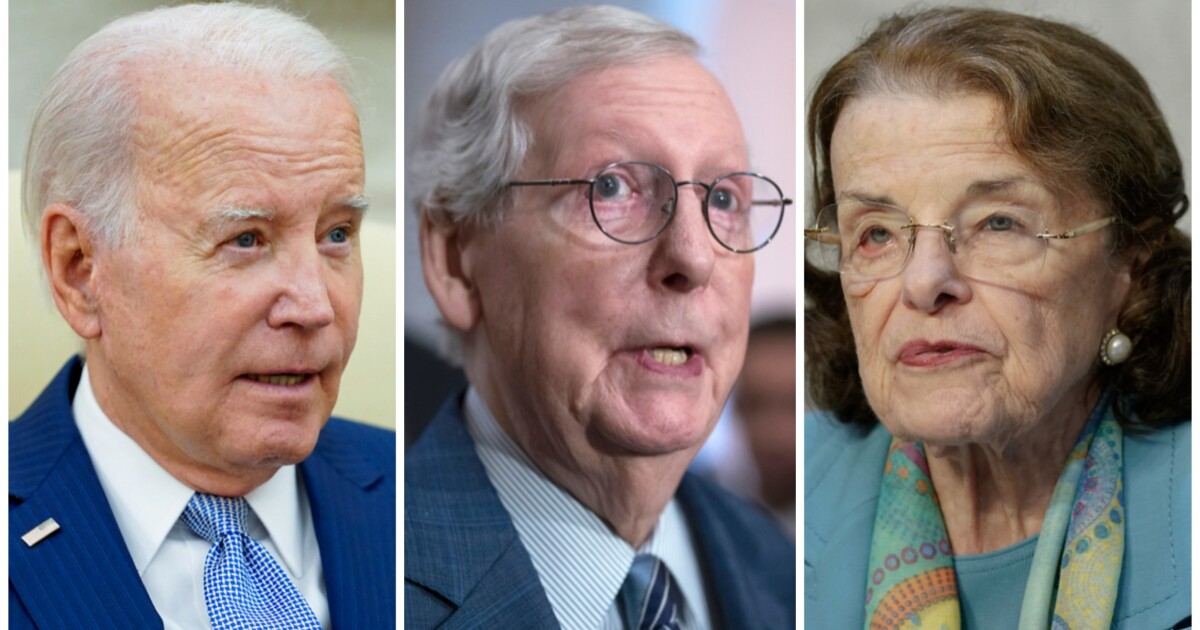

Senate Minority Leader Mitch McConnell (R-KY) flexed some political muscle in Kentucky over the weekend amid increased concern over his health.
McConnell, 81, was met with both cheers and jeers from the raucous crowds at the annual Fancy Farm picnic, one of his home state’s main political events, on Saturday. The seven-term senator, who is credited with leading the GOP’s rise to power in Kentucky, received a prolonged standing ovation upon his arrival at the Graves County Republican Party breakfast.
RON DESANTIS ACKNOWLEDGES TRUMP’S 2020 ELECTION DEFEAT: ‘OF COURSE HE LOST’
He quipped in a speech at the event that “this is my 28th Fancy Farm, and I want to assure you it’s not my last.”
At the marquee event later on, McConnell was undeterred by the loud chants of protesters screaming “Shame on you,” “Ditch Mitch,” “Retire,” and “Lost the Senate.”
The Republican leader plowed through his remarks, which took aim at Gov. Andy Beshear (D-KY) as he sat smiling nearby, while making no acknowledgment of the hostile eventgoers. After he wrapped up the speech, he smiled and waved to the hostile crowd with his arm around his wife, former Transportation Secretary Elaine Chao.
McConnell has been projecting normalcy since his highly publicized medical episode last month, in which he suddenly froze midsentence while speaking to reporters and looked ahead with an apparent blank stare for 18 seconds, sparked questions about his political future.
The top Senate Republican has largely tried to quash discussions about his health by noting that he’s “fine.” His office has not said if the minority leader has been seen by a physician since the freeze-up.
The lack of candor is not entirely surprising. McConnell, the longest-serving Senate leader in history, is revered as one of the greatest political operators of the last century. The GOP leader has been careful about how he presents himself to the press and the larger public, especially given that showing any signs of vulnerability could lead to questions about his power.
McConnell’s defiant certainty about his political future is similar to that of other septuagenarian, octogenarian, and even nonagenarian politicians in Washington, D.C., and has sparked discussions about whether the United States has a gerontocracy problem.
President Joe Biden is 80. Former President Donald Trump is 77. Should both men be their party’s nominee in 2024, as polling suggests is likely to happen, they’ll be the oldest candidates in American history.
Biden has already made history as the oldest commander in chief the United States has ever had. If he wins a second term next year, he’ll fall just short of making the top 10 list of oldest-serving leaders in the world. While the president and his team have framed his age as a reflection of his decades of experience, poll after poll shows it to be a liability for his reelection chances.
McConnell is both men’s senior, and he’s far from the oldest member of Congress.
Sen. Dianne Feinstein (D-CA), the Senate’s oldest member, has had memory and cognition troubles for years, though it wasn’t until her shingles diagnosis kept her out of the upper chamber for months that the 90-year-old’s condition became headline news.
The California senator has faced questions about her mental acuity for nearly half a decade as story after story reported instances of her forgetting conversations with top lawmakers and staff. Some reports have described her not recognizing longtime colleagues she had known for years.
She revived those concerns when she appeared unaware that her office had sent out the press release announcing her Senate retirement in February. Feinstein said at the time that she wouldn’t seek reelection in 2024, though she vowed to serve out the remaining 20 months of her term despite her recent shingles diagnosis and prolonged absence.
Facing resignation calls from House Democrats and frustration from her Senate colleagues that was spilling out into public view, a wheelchair-bound Feinstein returned to the Capitol in mid-May looking frail and at times disoriented. The 90-year-old has largely been kept out of public view since then, being whisked to and from votes and committee hearings by staff without taking many questions from journalists.
Feinstein has remained adamant that she will not resign before the end of her term despite concerns about her fitness to serve. She has described being a senator as her “calling.”
The six-term senator has had some struggles while carrying out her duties since her return. She garnered attention for disrupting a roll call vote at a Senate Appropriations Committee hearing late last month when she became confused about what was going on.
A Feinstein spokesperson said the senator “was preoccupied” and was unaware a vote had been called.
Sen. Chuck Grassley (R-IA), Feinstein’s junior by less than three months, has defended his longtime Senate colleague against the flurry of resignation calls.
“I think it’s a shame that they’ve been picking on her for two years,” Grassley said in May. “They’re picking on somebody that’s older, and it just doesn’t show the proper respect. So, let’s just leave it this way. They should leave her alone. She’s sick.”
The 89-year-old senator has faced some questions about his ability to serve at his advanced age, though he has largely dispelled those concerns through his impressive fitness routine and his penchant for challenging naysayers to push-up contests.
On the House side, former House Speaker Nancy Pelosi (D-CA), 83, and former House Majority Leader Steny Hoyer (D-MD), 84, stepped down from their leadership roles late last year to make way for a “new generation” to take over.
“For me, the hour has come for a new generation to lead the Democratic caucus that I so deeply respect,” Pelosi said from the House floor while announcing her decision last November. “And I am grateful that so many are ready and willing to shoulder this awesome responsibility.”
Former South Carolina Gov. Nikki Haley, 51, has made age a focus of her 2024 bid, calling for mental competency tests for politicians older than 75. The Republican presidential candidate has also suggested that Biden is unlikely to survive a second term, of which he would be 86 at the conclusion.
“America is not past our prime. It’s just that our politicians are past theirs,” Haley said at her campaign launch in February.
Several older lawmakers on both sides of the aisle have rejected the idea, including Sen. Bernie Sanders (I-VT) and former Arkansas Gov. Asa Hutchinson, Haley’s 2024 primary opponent.
Sanders, 81, called the idea “absurd,” saying in February, “We are fighting racism, we’re fighting sexism, we’re fighting homophobia — I think we should also be fighting ageism.”
“Trust people — look at people and say, ‘This person is competent, this person is not competent,'” the Vermont senator said at the time. “There are a lot of 40-year-olds out there who ain’t particularly competent. Older people, you know, you look at the individual, I don’t think you make a blanket statement.”
CLICK HERE TO READ MORE FROM THE WASHINGTON EXAMINER
“Well, there’s a mental acuity test every time you go to Iowa, and there’s a town hall meeting with the questions from the voters. They do a pretty good job of assessing those issues,” Hutchinson, 72, said late last month. “As a practical matter, you want a president to be in good health and in charge of the country in a good mental state, but the tests are not constitutional. And so it’s really something that’s a throwaway line that catches people’s attention.”
Trump, meanwhile, has embraced the idea, writing on his Truth Social platform in February, “ANYBODY running for the Office of President of the United States should agree to take a full & complete Mental Competency Test simultaneously (or before!) with the announcement that he or she is running, & likewise, but to a somewhat lesser extent, agree to a test which would prove that you are physically capable of doing the job.”




